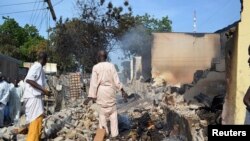ABUJA —
In the wake of more insurgent attacks in Nigeria’s countryside, the Nigerian army says it is increasing security along northeastern roads.
The Nigerian army has confirmed reports of an insurgent attack Sunday at a fake checkpoint on a northeastern road. The military said four people were killed, two were injured and that soldiers killed five of the attackers.
Army spokesperson Brigadier General Ibrahim Attahiru outlined the military's response. “Aggressive patrols on all the highways in the northeast are being intensified,” he said.
A motorcycle driver in Maiduguri, the Borno State capital, said that he saw eight people killed that day. Other news agencies have reported as many as 19 deaths.
Some witnesses said the attackers were dressed in fatigues and slit their victims’ throats. They were believed to be Islamist insurgents known as Boko Haram, but no one has claimed responsibility for the most recent violence.
Despite reports that the northeastern Nigerian countryside was becoming increasingly dangerous after security forces forced insurgents out of the cities, Attahiru said insurgents were not gaining momentum - they were just changing tactics.
“There’s no one solution that will solve all the insurgencies in the world. There are peculiar needs and we are approaching it based on the peculiar needs of the insurgency in the northeast,” said Attahiru.
Attahiru also confirmed reports that other attacks followed in the Konduga district of Borno State, not far from the border with Cameroon.
Witnesses in Maiduguri said that gunmen attacked villages in Konduga at night, ordering residents out of their houses and opening fire. In one village, the witness said seven people were killed before vigilantes chased attackers into the bush. Three vigilante security guards were killed in the chase, he said.
The army also reported a firefight over the weekend that started when insurgents fired rocket-propelled grenades and AK-47s. “A couple of terrorists” were killed, Attahiru said, and others fled across the border to Cameroon. Porous borders, he added, made battles in the region particularly difficult.
“They are not static troops. They are highly mobile. This is a very fluid operation. The environment is flux. Anything happens. These guys can get into Cameroon and come back," he said.
Boko Haram has been blamed for thousands of deaths in recent years, attacking churches, mosques, schools, communications networks, the local U.N. headquarters and government buildings.
The group said it wanted to establish an Islamic state in Nigeria, but some analysts said Boko Haram was fractured and secretive and there was most likely a host of reasons for the carnage.
(Abdulkareem Haruna contributed to this report from Maiduguri.)
The Nigerian army has confirmed reports of an insurgent attack Sunday at a fake checkpoint on a northeastern road. The military said four people were killed, two were injured and that soldiers killed five of the attackers.
Army spokesperson Brigadier General Ibrahim Attahiru outlined the military's response. “Aggressive patrols on all the highways in the northeast are being intensified,” he said.
A motorcycle driver in Maiduguri, the Borno State capital, said that he saw eight people killed that day. Other news agencies have reported as many as 19 deaths.
Some witnesses said the attackers were dressed in fatigues and slit their victims’ throats. They were believed to be Islamist insurgents known as Boko Haram, but no one has claimed responsibility for the most recent violence.
Despite reports that the northeastern Nigerian countryside was becoming increasingly dangerous after security forces forced insurgents out of the cities, Attahiru said insurgents were not gaining momentum - they were just changing tactics.
“There’s no one solution that will solve all the insurgencies in the world. There are peculiar needs and we are approaching it based on the peculiar needs of the insurgency in the northeast,” said Attahiru.
Attahiru also confirmed reports that other attacks followed in the Konduga district of Borno State, not far from the border with Cameroon.
Witnesses in Maiduguri said that gunmen attacked villages in Konduga at night, ordering residents out of their houses and opening fire. In one village, the witness said seven people were killed before vigilantes chased attackers into the bush. Three vigilante security guards were killed in the chase, he said.
The army also reported a firefight over the weekend that started when insurgents fired rocket-propelled grenades and AK-47s. “A couple of terrorists” were killed, Attahiru said, and others fled across the border to Cameroon. Porous borders, he added, made battles in the region particularly difficult.
“They are not static troops. They are highly mobile. This is a very fluid operation. The environment is flux. Anything happens. These guys can get into Cameroon and come back," he said.
Boko Haram has been blamed for thousands of deaths in recent years, attacking churches, mosques, schools, communications networks, the local U.N. headquarters and government buildings.
The group said it wanted to establish an Islamic state in Nigeria, but some analysts said Boko Haram was fractured and secretive and there was most likely a host of reasons for the carnage.
(Abdulkareem Haruna contributed to this report from Maiduguri.)





